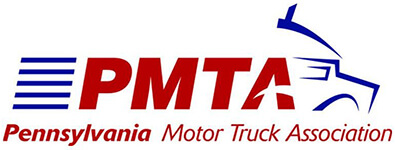PMTA submits comments on PennDOT's 2045 Freight Movement Plan
President and CEO Rebecca Oyler submitted the letter below to PennDOT yesterday, providing PMTA's comments on PennDOT's long term Freight Movement Plan. You can see PennDOT's proposed plans here: https://www.penndot.pa.gov/ProjectAndPrograms/Planning/Documents/LRTP/FMP-Sept2022.pdf.
Pennsylvania Department of Transportation
Attention: Michael D. Rimer, AICP
400 North Street
Harrisburg, PA 17120
Via email: penndotplanning@pa.gov
Dear Mr. Rimer:
Thank you for the opportunity to comment on Pennsylvania’s 2045 Freight Movement Plan (FMP). The Pennsylvania Motor Truck Association (PMTA) and its members have had several opportunities to review development of the plan throughout the process, and we are grateful for PennDOT’s responsiveness to feedback and suggestions from Pennsylvania’s trucking industry. As Secretary Gramian’s message indicates, freight planning is a complex and interconnected process in which the private sector plays a vital role, so PMTA values our constructive relationship with PennDOT and our many other partners in this endeavor.
We appreciate many aspects of the plan, including the focus on resolving truck bottlenecks, the emphasis on safety, aligning freight mobility with land use planning and economic development, and new analytical tools and resources. But our comments will concentrate on the FMP’s truck parking elements. In fact, as outlined in the plan, truck parking touches on all of these other aspects, and addressing it will yield progress in these and other areas.
As you know, due to the critical impact of truck parking on our industry, PMTA and its members have raised the issue of the severe truck parking shortage at several forums over the past several years, including in the Motor Carrier Safety Advisory Committee. At the federal level, the American Trucking Associations’ Law Enforcement Advisory Board has recently focused its attention on the issue due to its impact on safety for both truck drivers and the motoring public. PMTA’s members have also raised the issue as a driver recruitment and retention problem, especially for women drivers, whose concern for safe parking spaces is critical to an industry struggling with a nationwide shortage of about 80,000 truck drivers.
According to the U.S. Department of Transportation (USDOT), 98% of truck drivers regularly experience difficulties finding safe parking – a sharp uptick from the 75% figure reported just four years earlier. Based on PennDOT’s analysis in the FMP, Pennsylvania is no exception to this problem, with peak usage of the state’s already inadequate 11,600 truck parking spaces observed to be occupied by 12,150 trucks, or 105% of capacity. When drivers are unable to find safe, authorized parking, they are forced to either park in unsafe or illegal locations or violate federal Hours of Service regulations by continuing to drive. Both alternatives compromise safety for the driver and the motoring public.
Unfortunately, the situation in unlikely to improve without action. The FMP points out that freight activity in Pennsylvania will increase 51% in tonnage and 58% in ton-miles through 2045. With parking facility usage already at over capacity during peak periods, these trends demand action on the part of policymakers.
As such, we are happy to see the FMP focus necessary attention on the truck parking crisis, including updated data that illustrates the severity of the issue for the industry in our state and the addition of a performance measure specific to truck parking.
However, the critical nature of this crisis demands action sooner rather than later. Just last week, the Federal Highway Administration released its Truck Parking Development Handbook. This resource provides tools and strategies for public and private stakeholders involved in freight and land use planning that address many of the specific issues identified in the FMP. These include: how to conduct cost-benefit and economic impact analyses of truck parking projects; siting and designing locations for parking facilities; and specific strategies for developing safe truck parking facilities that meet the needs of large trucks. The handbook also includes useful examples of successful truck parking projects, including public-private partnerships that may provide models as Pennsylvania determines solutions to this problem.
The FMP notes that truck parking is not the primary mission of PennDOT, though it plays a role in solving the problem because of its transportation safety responsibilities. However, the role of the public sector in providing resources is critical. The Infrastructure Investment & Jobs Act (Public Law 117-58) made available significant resources to state and local governments to address the truck parking crisis. Construction of new truck parking capacity at rest areas or adjacent to private facilities is eligible for funding, as are improvements that allow for increased parking capacity at nontraditional locations, such as weigh stations and commuter lots, when appropriate. According to a memorandum issued by USDOT on September 20, 2022, these resources are available under several federal programs, including:
· National Highway Performance Program;
· Surface Transportation Block Grant Program;
· Highway Safety Improvement Program;
· Carbon Reduction Program; and
· National Highway Freight Program.
Transportation agencies can also apply to USDOT for grants under a number of discretionary programs, including:
· Nationally Significant Multimodal Freight & Highway Projects Program (AKA INFRA);
· National Infrastructure Project Assistance (Mega) Program;
· Local and Regional Project Assistance Program (AKA RAISE); and
· Rural Surface Transportation Grant Program.
PMTA stands ready to work with PennDOT and other partners on real-world solutions to the truck parking problem that the FMP documents well, including federal funding. The plan sets the stage well for the work ahead. Again, thank you for PennDOT’s hard work on the FMP and your willingness to work with PMTA and other industry partners.
Sincerely,
Rebecca K. Oyler
President & CEO
